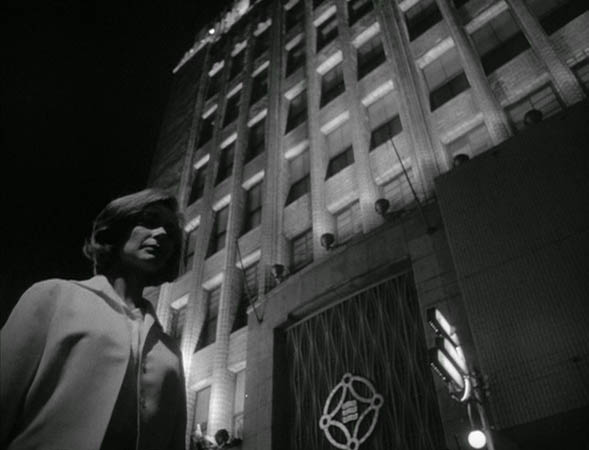The faces of the leads are not shown until the fifteen minute mark. For the first sixth of the movie there’s only the poetic narration faded with shots of their bodies and hands.
I don’t know what to say when confronted with Resnais or Marker movies, keep throwing out “poetic narration”.

Rest of the movie is conventional by comparison with the intro and with 90% of “Last Year at Marienbad”, but then “Marienbad” came afterwards and I’ve watched it a bunch of times, so I would have to say that.
IMDB plot: “While shooting an international movie about peace in Hiroshima, a married French actress (Emmanuelle Riva) has a torrid one night stand with a married Japanese architect (Eiji Okada). They feel a deep passion for each other and she discloses her first love in times of war in the French town of Nevers to him. He falls in love with her and asks her to stay with him in Hiroshima.”

The film is such a dream that when I finish watching it I seem to wake up and forget most of the details. This is the second time I’ve seen it and it never quite sticks. Ahh, dvd commentary will help.
Writer Marguerite Duras is a novelist whose book is sitting on my bedside waiting for me to read (update: oooh, it was good). Lead actor Okada was in Naruse’s “Mother”, “Rififi In Tokyo”, “X From Outer Space” and “Lady Snowblood”. He played the lead in “Woman in the Dunes”, the main character’s boss in “The Face of Another” and the man in white in “Stairway to the Distant Past” (released the same year Okada died). Riva (still alive) was in “Kapo” the same year, then starred in “I Will Walk Like a Crazy Horse” and played Binoche’s mother (?) in “Blue”. Shot by super master Sacha Vierny (“Marienbad”, “Muriel”, Bunuel, Ruiz, Greenaway) and Michio Takahashi (“Gamera vs. Barugon”). Editor Henri Colpi won the palme d’or at cannes two years later (tying with Viridiana) with his directorial debut.

Below is from the commentary track.
The intro reminds of Pompeii and “evokes the very beginnings of life”.
On the woman’s visit to Hiroshima’s hospitals and landmarks: “it will never be more than a theme-park experience”
Scenes from “Children of Hiroshima” are used precisely for their lack of authenticity, and the images remind of Nazi death camps.
Resnais was commissioned to make a film about the atomic bomb with Marker scripting, but it fell through, leading instead to this film.
Resnais and Varda both love cats (surely not as much as Marker does!)
Duras “would become the high priestess of French literature in the 1960’s and 70’s”
Despite not writing his own screenplays, “Resnais can fairly be described as an auteur because a majority of his feature films and many of his shorts deal with the nature of memory and its relationship to the present. Memories have a vivid present-tense quality in Resnais’s cinema and in Marienbad… they are almost indistinguishable from current incidents.”
Hey wow, he mentions “The Koumiko Mystery”.
The star of “Children of Paradise” had a similar thing happen – an affair with a german officer, then publically shamed with hair cut off after the war.
Resnais is an expert on comic books.



